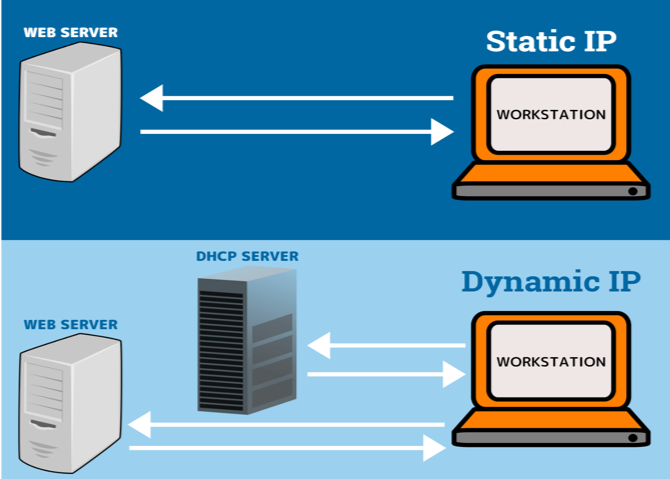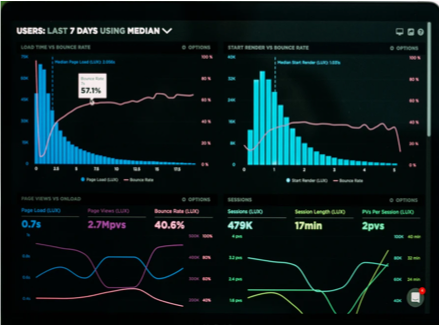STABILITY or SECURITY: CHOOSE BETWEEN STATIC IP AND DYNAMIC IP

STABILITY OR SECURITY: MAKE THE RIGHT CHOICE BETWEEN STATIC IP AND DYNAMIC IP
Business Internet Connectivity
It has become common for businesses like yours to be bombarded with broadband packages from various Internet Service Providers (ISP). Customarily, you will have to make a decision in selecting either a Static IP vs. Dynamic IP (Internet Protocol) business broadband for your internet access.
In spite of your company’s size and scope, you need to determine what the most pragmatic approach should be in selecting your company’s IP. Should it be Dynamic IP or Static IP? This blog will provide you with all the know-how regarding your IP selection so that you can make a well-informed and clear decision.
Static and Dynamic IP Explained
By definition of the words, Static and Dynamic imply something that is, respectively, fixed or constantly changing.
A Static IP will be configured manually by your ISP. They will assign a permanent IP address to a particular device you want to connect so that your devices will use the same IP address when connecting to the Internet. This assigned address remains unchanged until your business has deactivated the device or changed the overall framework of your network.
On the other hand, Dynamic IP will not be configured manually by your ISP. Instead, whenever your device is restarted, a new IP address will be assigned by your ISP’s Dynamic Host Configuration Protocol (DHCP) servers. Your device will sort of "lease" an IP address to get connected. This means that temporary IP address assigned by the DHCP servers will periodically change when each device connects to the internet. 1
Here’s an easier illustration to see how a Static and Dynamic IP would typically operate:

What are the differences?
Both Static and Dynamic IP will eventually provide you with an IP address to enable your device to communicate with others over an IP-based network. So you might be wondering, what are their differences? To give you a more comparative analysis, here are the 5 key components that differentiate Static and Dynamic IP.
|
|
Static IP |
Dynamic IP |
|
IP address: |
Does not change - Permanent IP address |
Changes Dynamically - Temporary IP Address |
|
Assignation: |
Assigned by the Network Administrator |
Assigned by the DHCP Server |
|
Configuration: |
Configured Manually |
Configured Automatically |
|
Sharing: |
IP addresses cannot be shared or used by any other device |
IP addresses can be shared |
|
Conventionally used by: |
Financial institutions and large corporations. - Used for dedicated servers. |
Private sector and residential areas - Used for connecting large network to the internet |
When should you opt for Static or Dynamic IP?
Google has stated that most users do not require static IP addresses in general.2 Dynamic IP is known to be the more popular option as they are undemanding and cheaper to deploy.3
Does this mean that Dynamic IP is the way to go? Well, not really. In fact, businesses would be more suited for a Static IP than residences. A Static IP will matter more if your external devices or websites need to remember your IP address.
Also, it is worth noting that internet connectivity can vary based on the nature and needs of your business. The benefits of Static and Dynamic IP that we share in this blog, will equip you with vital information in making an informed decision solely based on the benefits that your company could reap according to your business needs.
Opting for Static IP
According to Frontier Business there are three predominant reasons why your business should opt for a static IP.4 This is typically when your business:
- Hosts servers or websites - Including mail, File Transfer Protocol (FTP) and Virtual Private Network (VPN) servers
- Utilizes Voice over Internet Protocol (VoIP) or other digital voice services.
- Often permit employees to work remotely.
Although all the businesses do not operate based on the 3 points mentioned above, Static IP could still be important to your business.
To allow you to identify if it will suit your company’s internet connectivity needs, here are the 3 key benefits that Static IP will bring to the table:5&6
- Better Stability
- Faster Data Exchange
- Convenient remote access
1) Improved Stability

As we have previously mentioned, a Static IP address will never change. Which is why it is known to have a more stable Internet. If your IP address were to change on regular intervals, let's say every few hours, this could eventually cause a lapse in your internet connection. Furthermore, your devices might also have trouble reconnecting to the Internet given its new IP address.7
This is when a Static IP comes in handy. If your business relies on Voice-over phone systems (like VoIP) and applications that require broadband services to communicate, Static IP will deliver a more superior connection that is reliable.
2) Faster Data Exchange

If your business requires downloading and retrieving files at breakneck speed, the Static is the ideal IP to have8 because static IP addresses provide you with faster upload and download speeds.
Considering its inherent reliability on the internet, file transfers are easy and reliable, and data can be sent and received promptly.
3) Convenient Remote access

The extensive advancement in networking technology has made it easier than ever for employees to work from home. Your employees just need to connect their devices to your IP address to access their devices remotely at any place, anytime. This also includes your VPN or other remote access programs as they remember your static IP address.
Opting for Dynamic IP
Since we understand the nature of Static IP, under which circumstances do we need to select Dynamic IP? It is relatively simple decision to make as long as you have the company's desired goals on your mind. If you don’t use or plan to use any of the above technology or processes, a Dynamic IP for your business internet would be the way to go. Just like the Static, Dynamic will also have its own inherent set of benefits.
Here are the 3 main benefits that a Dynamic IP will bring to your business if you were to opt for it:5&6
● Better Security
● Lower Cost
● Unlimited IP addressing
Improved Security

As we have stated earlier, Dynamic IP address never remains the same. The address changes on each and every session when a device connects to the internet.
The advantage of Dynamic IP is that it will make the process harder for a potential cyber attacker to find where exactly you are situated in the network. This mitigates the cybersecurity risks by letting hackers look elsewhere instead of targeting your network, software and hardware.
You can also add an additional layer of security by masking your network address with a VPN.
Lower Cost

We understand that investing more than it requires on your internet needs is the last thing you want to do. The good news is that your ISP does not incur additional fees when you opt for a Dynamic IP address
Well, why does your ISP charge you a lower price?
Typically, your ISP’s DHCP server will assign an available IP address from a pool of reusable IP addresses to your device.9 Since your ISP would not have to purchase these IP addresses to “reserve” a particular address in the network, the cost will be reduced.
Unlimited IP Addressing

Dynamic IP will render unlimited IP addresses as it allows you to reuse un-utilized IP addresses. If you own a business that requires changing of devices or installing new ones occasionally, you may need to pay more attention to the choices you would make.
If you were to connect a device to your network, you do not need to manually disconnect the old IP address and assign a new one. This will ensure that two devices won’t be in conflict with one another on the network when using identical IP addresses.
As we have mentioned previously, the DHCP server (or router) will take care of this perpetual process automatically for you.
Summary - Static or Dynamic IP?
There are many comprehensive broadband plans available in today’s technology market. It is needless to say that selecting the most ideal internet connectivity plan plays a major role in the success of your company.
Based on the information provided in this blog, we can see both the Static and Dynamic IP bring certain benefits to your business.
Here is a quick summary of the benefits of Static IP and Dynamic IP:
|
|
Static IP |
Dynamic IP |
|
Improved Stability |
✔ |
|
|
Faster Data Exchange |
✔ |
|
|
Convenient Remote Access |
✔ |
|
|
Improved Security |
|
✔ |
|
Lower Cost |
|
✔ |
|
Unlimited IP Addressing |
|
✔ |
While Static IP provides the stability, ease of data exchange and remote access to businesses that host websites and/or internet services, Dynamic IP, on the other hand, brings about more affordability and security on the internet. These two factors needed to be taken into consideration when selecting an IP.
If you wish to find out more information on Static IP, Dynamic IP, or other broadband services, you can visit us at Netpluz. Alternatively, you may book an appointment for a free consultation.
Author: Shaun Nisal Peiris
References
- Iplocation.net, https://www.iplocation.net/static-vs-dynamic-ip-address.
- “Static vs. Dynamic IP Addresses.” Google Fiber Help, Google, https://support.google.com/fiber/answer/3547208?hl=en.
- “DHCP vs Static IP: What's the Difference?” Blog, 1 Aug. 2018, https://community.fs.com/blog/dhcp-vs-static-ip-differences.html.
- “Static vs. Dynamic IP-Find Out Which Is Right for Your Business.” Frontier Business, 7 May 2019, https://business.frontier.com/blog/static-vs-dynamic-ip/.
- “Static vs Dynamic IP: What Do You Really Need?” Udemy Blog, https://blog.udemy.com/static-vs-dynamic-ip/.
- Vaughan-Nichols, Steven J. Static vs. Dynamic IP Addresses, Avast, 31 Oct. 2019, https://www.avast.com/c-static-vs-dynamic-ip-addresses#topic-3
- Kurin, James, et al. “The Advantages & Disadvantages to a Static IP Address.” Techwalla, https://www.techwalla.com/articles/the-advantages-disadvantages-to-a-static-ip-address.
- Hayes, Brooke. “Dynamic vs. Static IP Addresses.” Business.org, 13 Aug. 2019, https://www.business.org/services/internet/dynamic-vs-static-ip/.
- “Blog.” Image, https://www.pacificinternet.com/en/blogs/115-blog10.html.

